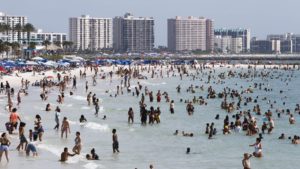
Clearwater beach nearly at capacity during Memorial Day weekend as law enforcement limits crowds to provide for proper social distancing Saturday.LUIS SANTANA | Times
“Dinner! Come on down, boys!” A father’s voice calls from the kitchen, a friendly clarion intended to prompt a pause in the video game. He listens for the sound of feet pattering down a staircase that creaks with the weight of two teenage boys.
Alas, there is no pattering. No creaking. Just silence.
“Dinner! Downstairs. Now!” This time it is a command, an order, a scold.
Two sullen boys, surrendering their last hope at autonomy, clomp heavily down the stairs, each step filled with resentment.
It’s a scene that plays out in countless houses at countless dinner times around the world. It is the tug of war between the parent and the child, the authority figure and the governed.
“You don’t control me,” the teenager thinks. “Yes, I do,” the parent asserts. It’s a win/lose, all-or-nothing battle about who has power.
This dinner time battle is a lot like the clashes that played out this Memorial Day weekend over social-distancing and mask-wearing versus beach frolicking and bar partying.
The big difference is that family squabbles over dinnertime don’t put lives at risk. In the fight against COVID-19, this all-or-nothing thinking can kill us.
Are You With Me or Against Me?
The terrifying advent of the novel coronavirus forced us to relinquish our control.
With its uncertain transmission and escalating death rate, we grabbed hold of the few things we could control – we went home, washed our hands and locked the door. But we took even those small steps by following orders.
Now, as America slowly emerges from 10 weeks in a fearful lockdown, we hover between this utter lack of control and a reemerging sense of full control we remember from before COVID-19.
That’s challenging.
Binary thinking is easy: is it over or is it not?
It takes mental discipline to make good decisions now, in between the outbreak and its resolution.
Either/Or Thinking Will Sink Us
Public health officials tell us the crisis isn’t over but it’s not so dire that we must remain locked down. They say go out – but wear a mask. See your friends – but avoid large gatherings. Go to the beach – but maintain social distancing.
They’re asking us to use our discretion, to exercise good judgment, to make wise decisions. They gave us the keys to the car, but warned us not to drink-and-drive.
This Memorial Day weekend, as state “stay-at-home” orders expired, we watched as revelers crowded the bars at Lake of the Ozarks in Missouri, as families mobbed the boardwalk in Ocean City, Maryland, and as 2,500 racing fans packed the stands at Ace Speedway in Elon, North Carolina.
Their opportunity was to take the middle road between no control and all of it. They failed. Spectacularly.
What can we learn from this utter failure to strike a reasonable balance?
Reject the All-or-Nothing Fallacy
Our mind plays games with us. A teenager thinks that by coming down to dinner when called — by obeying one rule — he is ceding all control to a parent. In a teenage mind, it’s “all-or-nothing.”
The truth, we know, is nuanced.
As a child grows older, parents cede more authority, whether it’s over how a teen spends her time or who she chooses to befriend, even as some rules remain in place for her own safety. Yes, you can go out, but be home by midnight.
This new phase of coronavirus introduces the complex dynamics of shared control, shared responsibility and shared judgment. It requires cooperation between government and individuals, businesses and communities.
Successfully getting through this next phase of pandemic living — reopening society while minimizing harm — requires that we reconcile our relationship to control.
Achieving that entails a rejection of oversimplified thinking and binary reasoning. It necessitates deliberation and discernment.
When governors lifted the stay-at-home orders, the people at Lake of the Ozarks, the raceway and the beach chose the all-or-nothing route. They chose the teenager’s battle cry: You don’t control me. I can do whatever I want, even if that means taking actions that imperil my personal safety just to prove you can’t tell me what to do.
That’s the all-or-nothing fallacy in action.
Nobody wins that fight.
While it causes tension at the dinner table, that mindset threatens lives on the beach. As COVID-19 continues to infect people, we need to help one another spot that mental trap before it leads to bad calls on live-or-die decisions.